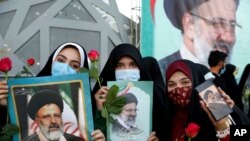Iran's interior minister on Saturday declared judiciary chief Ebrahim Raisi the winner of the nation's presidential election, saying he'd drawn 17 million of the 28 million votes cast.
The interior minister, Abdel Reda Rahmani Fazli, said 48% of Iran's 59 million eligible voters participated in Friday's election.
Raisi, a close ally of Supreme Leader Ayatollah Ali Khamenei, is due to take office in August. Regional governments reacted with little surprise to his victory, and it was unclear if the winner would be able to improve relations with Iran's Arab neighbors.
A number of Iranian political leaders had called on the Iranian people to boycott the election, among them former hardline President Mahmoud Ahmedinejad and People's Mujahedeen leader Miriam Rajavi.
Former Iranian diplomat Mehrdad Khonsari told VOA that the vote was a clear disavowal by the Iranian public of Khamenei and of the "deep state" apparatus that runs the country.
"This is a positive development in the sense that it places [Iran's] deep state squarely in front of the people," Khonsari said. "Khamenei and his cronies no longer have any contractors to present a different face of the true nature of the regime to the outside world and to the Iranian people."
Repudiation of reformers
Khonsari stressed that voters also repudiated Iran's moderate "reform" movement, which reportedly won 2009's presidential election before the government backtracked on the results. "The election," he said, "showed the lack of confidence the public had in any remnants of the reform movement, who were not able to get their act straight or act in a cohesive manner to stand with the majority of Iranians to boycott the election."
Former Iranian President Abolhassan Bani Sadr, who lives in exile in Paris, said in a statement that the vote consecrated "the imposition of a president on the Iranian people," who he insisted "refused to accept it. The Iranian people, with [their] collective conscience, refused to accept the imposition of a man known by history as a murderer."
Amnesty International also castigated Raisi for his alleged role in "death squads" that killed innocent civilians during the country's 2019 protests, as well as for killings that reportedly took place during the late 1980s.
Khamenei said in a statement Saturday that "the Iranian people were the winners of [Friday's] presidential election" and that "nothing stopped them from going out to vote."
Outgoing President Hassan Rouhani, who was ineligible to run for a third term, congratulated the Iranian people for their choice of the man who he said "clearly won the election."
Kuwaiti analyst Mohammed Dowseri told Arab media that "Iran represents a threat to the security of Gulf states and it understands that," adding that Tehran "needs to make some concessions over Syria, Iraq, Lebanon and Yemen" before any rapprochement is possible.
Arab states made little apparent effort to congratulate Raisi for winning the election, other than Iraq and Syria, which have close ties to Tehran. The prime minister of neighboring Pakistan, Imran Khan, also congratulated Raisi, as did Russian President Vladimir Putin, who enjoys close ties to Tehran.




